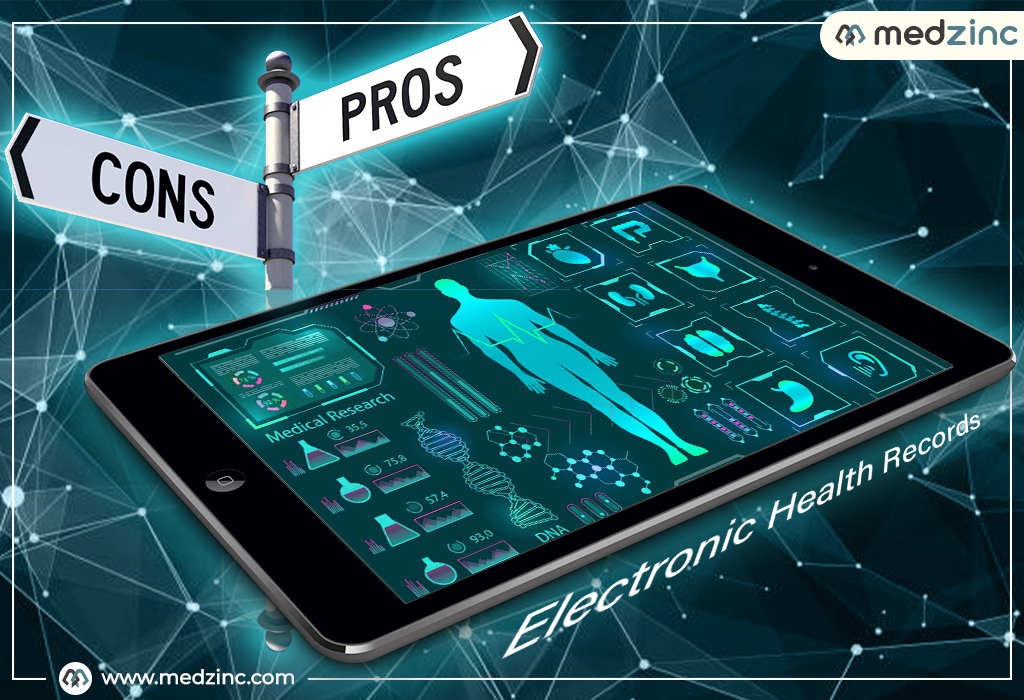
Electronic Health Records- Pros and Cons
Pros and Cons of Electronic Health Records. EHR has the clinical relevance results such as enhanced efficiency, better outcomes, and fewer complications, as well as operational and financial advantages for enhanced public health. The disadvantages of EHR involve large initial capital cost and work process interruption that contribute to momentary economic damage due to introducing a particular system. As a result, "Medzinc" has come along to confront the Pros and Cons of Electronic Health Records. Furthermore, we will discuss the benefits and drawbacks of electronic health records in order to increase their adoption. What Is EHR ( Electronic Health Records) ? An automated model of a patient's paper graph is an electronic health record (EHR). EHRs are ongoing, patient-focused health records that make data available immediately and securely to only approved clients. Furthermore, it can provide a more comprehensive perspective on a patient's consideration. EHRs are important in healthcare IT because they can store
- Patient's clinical history,
- Analysis,
- Prescriptions,
- Treatment plans,
- Vaccination dates,
- Sensitivities/allergies,
- Radiology images, and
- lab test results.
EHR computerised and smoothed out the supplier work process .
Pros and Cons of Electronic Health Records
Pros of Electronic Health Records
1. Improves Quality of Patient Care
One of the most significant benefits of an EHR system is that it improves the quality of patient care delivered by medical service providers. By viewing or printing chart values such as cholesterol levels, blood pressure, and weight over time, EHRs provide better analysis and information. Furthermore, its comprehensive real-time reporting and e-prescriptions help to improve the quality of patient care.
2. Time Saver
Next Pro or the benefit of EHR framework is help save a lot of time. Moreover, due to its data collecting and easy to access ability it makes it earlier for medical providers to access patient medical history quickly at the time of emergency.
3. Patient Portal Access
The best way to increase patient engagement and save time is to have a highly effective patient portal access in EHR. And this is where the EHR framework excels. Moreover, It improves accuracy and promotes positive outcomes by encouraging patient participation. Today's EHRs, when combined with online portals and mobile applications (apps), enable greater two-way data flow and provide greater access to medical data, encouraging patients to be active participants in their care.
4. Eases Data Collection & Reporting Process
One of the most intriguing benefits of an EHR system is that it simplifies the data collection and reporting process. Because of the likeability and ease of use of customised ehr systems and formats, all monotonous and duplicative tasks can be automated. As a result, both healthcare providers and patients can securely access, share , and exchange medical information online.
Cons of Electronic Health Records
1. Cyberattacks Issues
The most serious threat or disadvantage of the EHR system is that it is highly susceptible to cyberattack. However, all computer systems are vulnerable to hacker attacks, and EHR systems are no exception. Because patient healthcare information is among the most sensitive types of data, healthcare professionals must implement an enhanced data protection tactic for one‘s EHR systems.
2. EHR-Burnout Issues
Burnout caused by EHRs is a real and legitimate problem among healthcare professionals. Moreover, Growing demands for data input into an EHR system cause EHR-related burnout among doctors. Furthermore, research shows that steadily increasing EHR-related data entry demands are linked to lower job satisfaction and burnout. We post such informational blogs regularly. Do check out our other Blogs.
Related Post
No results.